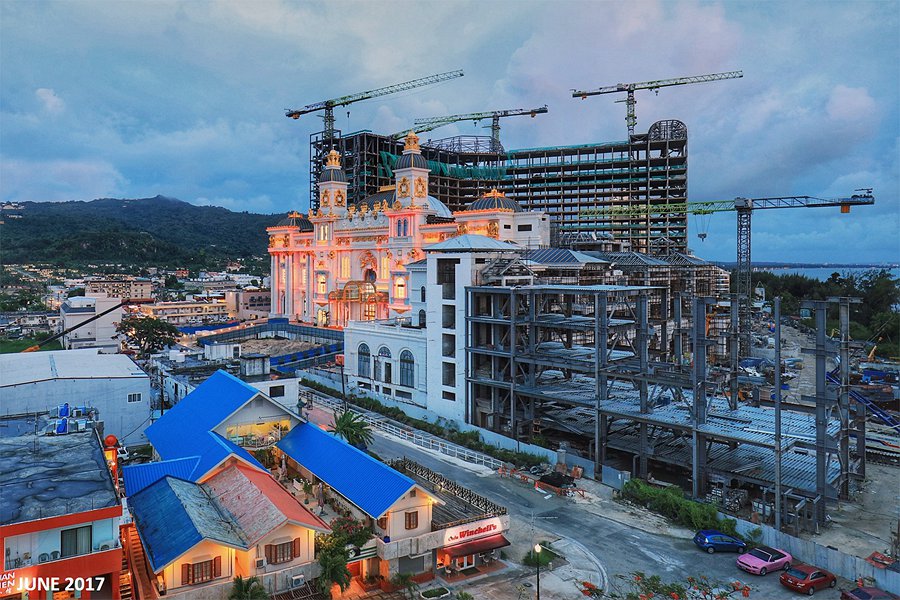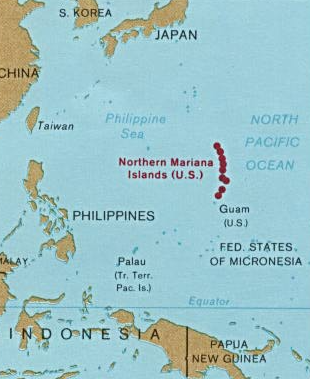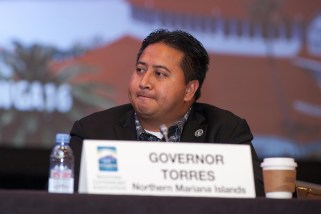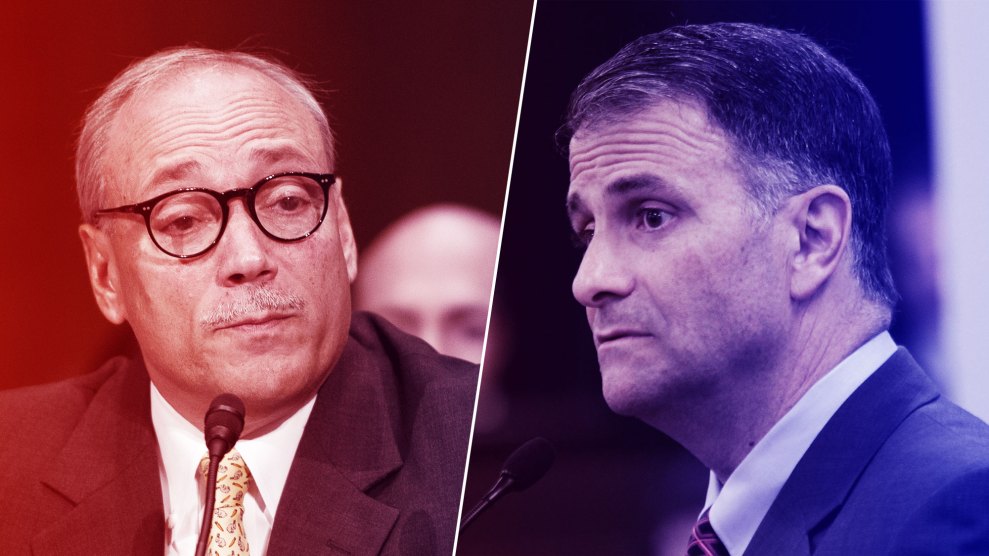
A rendering of the Imperial Pacific casino and resort in the Northern Mariana Islands.Imperial Pacific
When the Best Sunshine Live casino opened in the Northern Mariana Islands in late 2015, the local press described it as a temporary training facility for a forthcoming permanent casino. It was nestled in a drab duty-free mall on Saipan—a US island nearly 4,000 miles west of Hawaii—and lacked the usual trappings of a casino, such as a hotel. A year later, Bloomberg reported that it might be “the most successful casino of all time.” Best Sunshine’s VIP tables were each bringing in nearly eight times as much money per table as those at the biggest casinos in Macau, the most lucrative gambling haven in the world. Macau gambling promoters told Bloomberg that Imperial Pacific, the casino’s Hong Kong-based owner, was either inflating its numbers or facilitating money laundering. Eight casino executives and analysts later said there was no way to generate such high betting volumes legitimately.
Local critics have alleged that Imperial Pacific, with the backing of the islands’ government, has evaded regulation as it puts workers in danger and enables a sketchy scheme for Chinese gamblers to convert money into foreign currencies. But as the company and the government make their latest push in Washington, seeking permission from Congress to hire foreign workers for the casino and other businesses, they have powerful allies on their side: two former Donald Trump campaign aides and their Washington lobbying firm with ties to onetime Trump campaign manager Corey Lewandowski.
Their work is part of a now-familiar pattern of former Trump advisers signing up lobbying clients with ties to foreign officials or companies battling allegations of misconduct. The efforts to trade on connections to Trump often aren’t subtle. Turnberry Solutions, the firm founded by the Trump campaign aides lobbying for the Northern Mariana Islands, shares a name with the Trump Turnberry golf resort in Scotland.
A few months after Trump became president, the Commonwealth of the Northern Mariana Islands (CNMI) hired former Trump campaign adviser Jason Osborne to be its man in Washington. (Osborne had previously advised the former CNMI governor.) A business card obtained by Mother Jones lists Osborne as the director of the Washington office of the CNMI government. And in September 2017, the CNMI hired Turnberry Solutions, founded by Osborne and fellow Trump campaign veteran Mike Rubino, to secure the extension of a foreign work visa program that drives the local economy, including the casino. The Northern Marianas Business Alliance, a newly formed group of local business interests that includes Imperial Pacific, hired Turnberry one week later.
Politico reported in November that Lewandowski was working and sleeping in Turnberry’s Capitol Hill office when he was in Washington and that he had once been on a conference call with Turnberry and one of its clients. His friend John Fredericks told Politico the building could be considered the “Turnberry Embassy” before adding, “Nobody knows what Turnberry is, so I would call it the Lewandowski Embassy.” But Lewandowski has denied any involvement with Turnberry. Osborne told Mother Jones this month that Lewandowski “has nothing to do with the CNMI or the firm.” Fox News reported soon afterward that Lewandowski is joining Vice President Mike Pence’s political action committee to work on the 2018 and 2020 elections.
Osborne says he was asked to serve as the Washington “eyes and ears” of the CNMI’s Republican governor, Ralph Torres. His lobbying focuses on extending the CW-1 visa, a temporary guest worker program for the CNMI that has broad support in the local business community. Osborne says he is not lobbying to protect Imperial Pacific from potential money-laundering violations. The Government Accountability Office estimated last year that the CNMI’s GDP would have been 26 to 62 percent smaller in 2015 without CW-1 workers, who come mainly from the Philippines. A bill introduced by Sen. Lisa Murkowski (R-Alaska) to extend the visas through 2029 passed the Senate unopposed last month, and Osborne said he is “cautiously optimistic” that the bill will become law.
Imperial Pacific’s casino relies heavily on foreign labor. In addition to CW-1 visas, Imperial Pacific received permission from the federal government earlier this year to hire roughly 1,500 workers through the H-2B guest worker program. Its contractors have also used unauthorized laborers from overseas. Last March, an undocumented Chinese worker fell to his death at an Imperial Pacific construction site, and colleagues brought him to the hospital in his underwear to obscure his identity and told hospital workers that he fell off a balcony. A week later, the FBI searched the office of an Imperial Pacific contractor who had employed the dead worker through a subsidiary and found spreadsheets listing more than 150 workers as “hei gong,” the Chinese term for undocumented worker. The federal government used the information to charge employees of Imperial Pacific contractors with violating a human smuggling statute. Most of the undocumented workers were sent home after the charges were filed, according to Bloomberg.

Imperial Pacific’s Saipan construction site in June 2017.
Imperial Pacific
In May 2017, the Occupational Safety and Health Administration proposed fines against Imperial Pacific contractors after finding that the construction site lacked safe scaffolding and adequate fall protection. A Department of Labor inspector said in a court declaration that a worker who arrived at the emergency room with a broken back was “promptly transported” to China, even though a doctor recommended immediate hospitalization.
In March, four Chinese contractors working on Imperial Pacific’s permanent casino agreed to pay nearly $14 million in back wages and damages to more than 2,400 employees as part of a settlement with the Department of Labor. Chinese workers did not receive minimum wage or overtime, the Department of Labor found, and they took on debts of more than $6,000 to work at the construction site, which they then had to pay back through their labor. Osborne says Torres has “done a great job of stepping up enforcement and working with the entire business community to try and make sure that everybody is on the same page, particularly as it relates to workers.” He adds, “They know that the federal programs they rely on aren’t going to be there long-term if they don’t get their act together.”

The Northern Mariana Islands were administered by the United States following World War II, and the CNMI officially joined the United States as a territory in 1976. Not subject to US minimum wage and immigration laws until 2009, the CNMI came to depend economically on garment factories that could stamp clothes as “Made in the USA” despite sweatshop conditions. As Mother Jones reported last year, US Deputy Labor Secretary Patrick Pizzella played a key role in a campaign, led by lobbyist Jack Abramoff and championed in Congress by then-House Majority Whip Tom DeLay, to defend working conditions at the foreign-owned factories. (Abramoff received a four-year prison sentence in 2008 for charges including corrupting public officials and tax evasion, while DeLay’s 2010 conviction on conspiracy and money laundering charges was overturned in 2013.)
Now that the garment factories have shut down, Chinese-owned casinos are moving in as the next big politically-connected industry. Casinos outside of mainland China—in Macau, which is economically autonomous, and now Saipan—are attractive to wealthy Chinese nationals trying to convert their yuan to foreign currencies in order to prevent possible seizure by their government. Gamblers evading Chinese currency controls often play baccarat, a game where the house’s advantage is relatively small, with chips provided on credit. They can then cash out in dollars before paying back the debt in China with yuan.
The Internal Revenue Service sent a “Letter of Examination” to Imperial Pacific in March 2017 and conducted an on-site inspection of its financial reporting process in July, according to written responses Torres sent to a Senate committee after a February hearing. In 2016, a former vice president at the Best Sunshine Live casino sued Imperial Pacific for wrongful termination, alleging that the company had fired him after he told superiors that it was instructing gamblers on how to avoid US anti-money-laundering regulations. Imperial Pacific denied the allegations before reaching a settlement last March. (Mark Brown, a former top executive at Trump’s now-defunct casino company, served as Imperial Pacific’s chairman until December.)

CNMI Gov. Ralph Torres.
Daren Fentiman / ZUMA
Bloomberg reported in February that Imperial Pacific has paid millions of dollars to lease land from Torres’ relatives. In 2015, the governor’s sister-in-law bought a piece of land for $180,000 and leased it about five months later to what appeared to be an Imperial Pacific shell company for $667,000. The lease was signed by a member of Imperial Pacific’s board and the governor’s older brother. Torres wrote on his Facebook page that “any allegations” in the Bloomberg article are “blatantly false” and reflect the perspective of “an off-island writer from London.” Torres’ office sent Mother Jones an earlier statement that called the allegations about the land deals in the article “improper” and said the article “lacks an understanding of the size” of the CNMI and the governor’s family, which includes 70 first cousins. Imperial Pacific also provided a earlier statement that said the company “repudiates all allegations of wrongdoing” in the article and would “take legal action where warranted.”
Juan Babauta, a former CNMI governor who is trying to unseat Torres in this year’s election, told Mother Jones, “It is common knowledge that the governor of the CNMI is in the pocket of the casino industry.” Babauta later clarified that he was not personally accusing Torres of corruption but rather characterizing a common sentiment on the islands.
In March, Bloomberg reported that federal agents raided an Imperial Pacific office in Saipan. It was not clear what they may have been looking for. The FBI said in a written statement that it “does not regularly comment on criminal investigations,” but it added that “public corruption is the FBI’s top criminal investigative priority.” Imperial Pacific denied that the raid took place and said it would “take legal actions immediately” in response to the Bloomberg story.
If Imperial Pacific is investigated for financial wrongdoing, it would not be the first CNMI casino operator to attract federal scrutiny. In 2015, the Treasury Department’s Financial Crimes Enforcement Network fined the now-shuttered Tinian Dynasty casino $75 million for “egregious anti-money laundering violations.” Jennifer Shasky Calvery, the Financial Crimes Enforcement Network’s director at the time, said the casino’s “management willfully facilitated suspicious transactions and even provided helpful hints for skirting and avoiding the laws in the US and overseas.” Torres told senators last year that the casino was not aware that it was subject to the federal anti-money-laundering measures, but casino operators in the CNMI now “have full understanding of the application of federal regulations” and are “expected to conform to them.”
Along with his lobbying, Osborne serves as the executive director of the CNMI Republican Party and advised the Trump campaign on territorial policy. Trump took 73 percent of the vote at the commonwealth’s Republican caucus after Torres endorsed him. Last April, Torres met with Trump in the Oval Office. “This is the first governor to endorse me,” Trump boasted. “He is a longtime friend.”
Osborne says he first got involved in the CNMI more than a decade ago, when a friend introduced him to then-Gov. Benigno Fitial. After working on Fitial’s successful reelection campaign, Osborne was called in by an investment bank to defend a controversial energy deal that helped take the governor down. In August 2012, Fitial approved a $190 million no-bid power plant deal soon after issuing a disaster declaration that allowed him to award sole-source contracts. The deal called for building a diesel plant even though Fitial had argued that a “renewable energy crisis” was one of the reasons he needed emergency powers. (The power company was promoted on Saipan by a mainlander who had served 18 months in prison in the 1980s for theft and fraud related to a phony oil deal.)
Fitial was later impeached for a wide range of misconduct, including approving the power deal. He also pleaded guilty to charges related to temporarily releasing his masseuse from prison so that he could receive a late-night massage at home and directing local police to physically block a summons from getting to his attorney general—a move that led to a dramatic showdown at the airport, captured by local TV station KSPN:
When it comes to his current work, Osborne says the CNMI has no viable alternative to the CW-1 visa. He has no concerns about representing the casino through the business alliance. The CNMI, he says, needs workers “regardless of what happens to Imperial Pacific or what’s going on there.” He says Turnberry makes only $5,000 a month from the CNMI, adding, “I do it because I love the people of the CNMI, and I’m not out for anything other than that.” Turnberry was also paid $130,000 to lobby for the business alliance from September through March.
Babauta, the former governor challenging Torres, sees Osborne’s lobbying through a more cynical lens. Babauta says he wouldn’t be comfortable representing Torres in Washington, arguing that it would be hard to do a honest job on his behalf. But, he adds, “money talks to a lot of people.”
This story has been updated to include Osborne’s role advising the former CNMI governor.
















